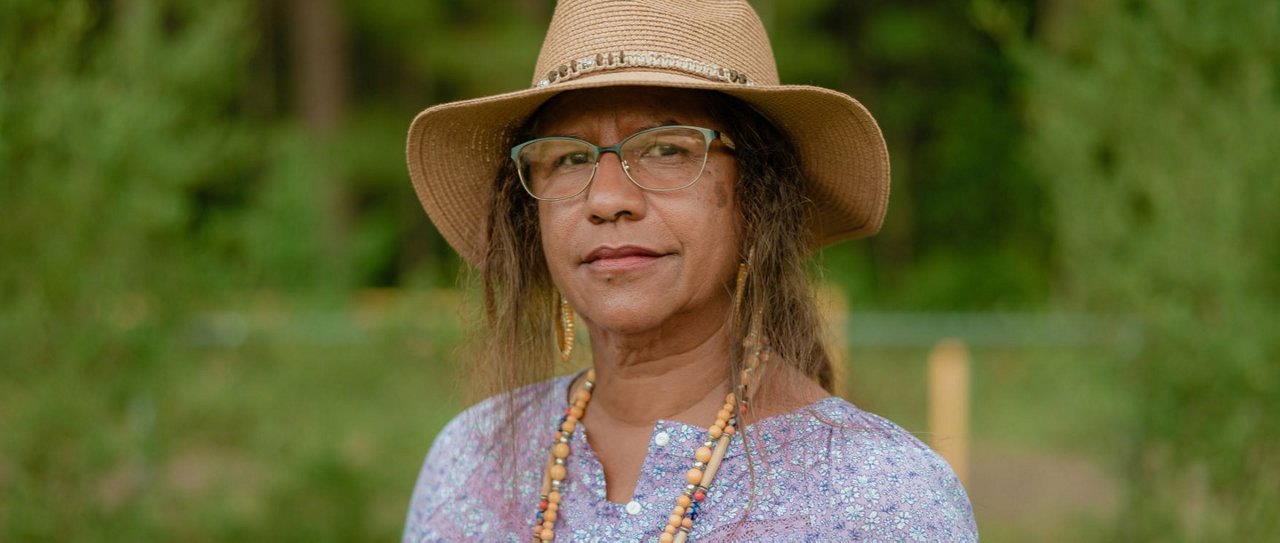Preserving the health of the tribe

Legend has it that thousands of years ago, a shooting star hit the earth in southeastern North Carolina, furiously shifting the surrounding rivers and swamps, filling the sizzling crater. What resulted was Lake Waccamaw, the land of the Waccamaw Siouan tribe – aptly known as, “the people of the falling star.”
The first historical record of the Waccamaw Siouan appeared in 1712, but more than 300 years later, there is much left unknown. So, when canoes dating back to the 12th century were discovered in Lake Waccamaw after Hurricane Florence dredged its waters in 2019, local tribe members received something they don’t have much of – their own past.
Darlene Graham, a proud Waccamaw Siouan and grandmother of four, is committed to uncovering more of the history of her people, so that the tribe’s 2,000 plus members can better understand and preserve their culture – and draw on it to enrich their own lives and improve their health.
While studying what is currently known about the Waccamaw Siouan tribe, Graham learned that the Yaupon Holly tree was used by their ancestors as a detox, a salve, a ritual drink, and much more. Around the same time, her husband, Mike, came across a tree in the woods that caught his attention. “He was so intrigued by this tree,” she says. “When he took me to see it, I said, ‘That is a Yaupon Holly.’ I just could not believe it. It amazes me how these plants are connecting us back to our culture.” Even more serendipitous was that the tribe had received several trees from a movie production crew that had filmed near their land. Among them was a Yaupon Holly.
Other native plants and vegetables are finding their way back to the tribe as well. Professors and historians from NCSU and USC recently presented the Waccamaw Siouan tribe with corn. Not just any corn, but Sea Island corn, a crop that Graham’s ancestors harvested long ago. The heirloom seeds have “connected us back to our people,” Graham says. “We planted the corn, and we saved the seed from it, and this year we planted again, and hopefully we’ll have a successful crop.”
Every tree, every berry, every kernel of corn not only brings cultural value, but nutritional value as well. It’s needed now more than ever. According to the National Congress of American Indians, Native people suffer from higher rates of diabetes and related illness, heart disease and substance use disorders than any other group, and have a life expectancy that’s nearly six years less than any other race or ethnic group in America.
Unfortunately, these dire statistics are reality for the Waccamaw Siouan people.
“There are so many challenges that I see, such as drug addiction, alcoholism, cancer, diabetes, and heart disease.” Graham has witnessed firsthand the impact of chronic illness on the young and old – her own nephew was only 36 when he died of a heart attack.
This is one of many reasons why Graham is leading the effort to bring healthy living back to tribe members through a healing green space on their land in Columbus County. Here, volunteers grow vegetables that include corn, squash, cucumbers, turnips, and collards, which are then distributed to tribe members.

Along with food, they’re also growing medicine. Elderberry to boost immunity. Mullein for the respiratory tract. Catnip for colicky babies. Some of the same plants their ancestors used for health and wellness, and in many cases, survival. They find them growing in the wild, and harvest sparingly, taking small portions and giving thanks to the plant.
Graham hopes that the longevity of the tribes’ crops will impact the longevity of the people themselves.
The independent Blue Cross NC Foundation is also supporting Graham’s community and other tribal communities across the state through a four-year grant that aims to address long-standing health inequities in North Carolina’s Native American tribes. For the Waccamaw Siouan, a past Foundation grant for COVID relief brought them agricultural equipment to reap and sow their crops.
“I’ve told [my fellow tribe members], ‘Hey, the equipment’s here, and if you can use this equipment to make yourself healthier, then that’s a way that we can make the whole tribe healthier,” Graham says.
Blue Cross and Blue Shield of North Carolina (Blue Cross NC) provides the Waccamaw Siouan community with a tribal liaison who works in coordination with Healthy Blue, Blue Cross NC’s Medicaid offering, to best serve the community’s needs.
Their tribal liaison, Teryn Brewington, says that giving Native people a platform is key to helping them overcome their health care challenges.
“Our tribal communities in North Carolina possess overwhelming strengths that have allowed them to survive for thousands of years,” she says. “One of those strengths is their profound understanding of their people. As our state works to improve health outcomes, it’s important to hear Native people’s voices.”
Brewington believes that these voices are best equipped to outline local health care needs, and that understanding each community’s specific needs is the first step to improving its overall health.
“The tribe is the expert and they will be able to best tell us what works for them,” she says.
To foster conversation within the tribe itself, Healthy Blue, through Value-Added benefits, supports the Waccamaw Siouan Talking Circles, groups of tribal members and health care providers who meet for discussions on healing and cultural enrichment.
Healthy Blue also sponsors cultural and community events, like PowWows, approaching health care from a holistic perspective, recognizing the influence that culture and communication have on community health.
Graham strongly believes that her tribe needs additional educational resources on substance use disorder prevention, mental health support, and the importance of self-care – something that doesn’t happen in a community where few people ever retire.
Though life is filled with challenges for the people of the Waccamaw Siouan tribe, they share a culture rooted in generosity, spirituality, and pride of heritage. Their annual PowWow invites the public to come experience the traditions they hold dear, from quilting and weaving to drumming and dancing. It’s also a time for the tribal community to reconnect with each other.
In quieter moments, the Waccamaw Siouan meet to practice gratitude in their healing green space.
“We have a cross there, and a plaque with people of the falling star at the foot of that cross,” Graham says. “We look to the Great Creator for our healing. May it come through the doctors, plants, or whatever the Creator provides. That’s who we look to as a people.”
Browse related articles


Blue Cross and Blue Shield of North Carolina does not discriminate on the basis of race, color, national origin, sex, age or disability in its health programs and activities. Learn more about our non-discrimination policy and no-cost services available to you.
Information in other languages: Español 中文 Tiếng Việt 한국어 Français العَرَبِيَّة Hmoob ру́сский Tagalog ગુજરાતી ភាសាខ្មែរ Deutsch हिन्दी ລາວ 日本語
© 2024 Blue Cross and Blue Shield of North Carolina. ®, SM Marks of the Blue Cross and Blue Shield Association, an association of independent Blue Cross and Blue Shield plans. All other marks and names are property of their respective owners. Blue Cross and Blue Shield of North Carolina is an independent licensee of the Blue Cross and Blue Shield Association.



